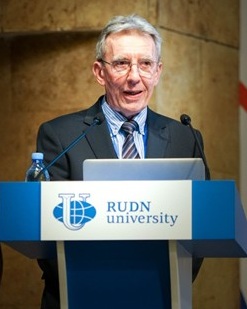Advances in Synthesis and Complexing Conference
“I realized that I wanted to become a scientist when I was 16. Even then I loved to solve difficult problems. And I dreamed of becoming a mathematician. But at 18, I realized that in order to become a great mathematician, you have to be a genius, even a monster. And I was not a monster in mathematics, while around were those who were clearly better than me. It’s good that all those years I never stopped studying chemistry - I had a small laboratory in my house. I just shifted the focus to other formulas”, - Nobel laureate Professor Jean-Pierre Sauvage told the RUDN students.
At the same time, Professor at the age of 3 to 18 changed school 15 times due to frequent family relocations. He lived in Africa, America and Europe having to miss a lot of classes, catch up on the material on his own and also learn to communicate with different people. Among the necessary skills of a modern successful scientist, Professor Sauvage called the ability to explain to ordinary people the results of his research (“talking to general public”), speak English and be ready for frequent trips. It is also important to be able to work in a team and be able to share success with the team. Professor Sauvage - about success: “There is no single formula for how to become a famous scientist. We must live by science and not think about fame, we must find a reason to be surprised. And this helps others. If someone says: “Wow! What are you doing? ”- listen, explain, and see for yourself that you are doing something important,” – said Professor Sauvage.
“Sometimes they told me that my name was on the list of candidates for the Nobel Prize. And every time I smiled, not believing that someday this will happen. Often the chemistry prize went to biochemists or those involved in physical chemistry and extremely rarely to those who, like me, worked in the field of pure chemistry. At the same time, they often gave preference to those whose discoveries were of an applied nature, and although molecular machines have application, they really do, but I understand that it is limited. But despite my disbelief and despite the background of the laureates, everything worked out. And I am convinced that it is impossible to say that applied research is more important than fundamental research, or vice versa. The main thing is novelty.”
After receiving the Nobel Prize, the life of Professor Sauvage changed - there is more attention from the press and colleagues, you have to travel even more, and you have less time to work with graduate students. The Nobel laureate advises not to ignore one’s personal life.
 Professor Sauvage plays ping-pong, communicates with his graduates in person and on the Internet and reads a lot. It helps to find inspiration and answer people's questions. Favorite discovery? Periodic Table, because it is ingenious and useful. Favorite scientist? Antoine Lavoisier, because he introduced the fundamentals of quantitative analysis to chemistry. What book do you recommend reading? “Notre Dame de Paris” by Victor Hugo, because one cannot stand aside from the tragedy at the World Cultural Heritage Site. The meeting of Nobel laureate Professor Jean-Pierre Sauvage with students was held at RUDN conference “Advances in Synthesis and Complexing”, where more than 50 leading chemists from 15 countries present their answers to topical issues of organic, inorganic, medical, physical and colloidal chemistry. The geography of the participants is impressive: Belgium, Great Britain, Germany, Israel, Iran, Spain, Italy, Canada, Poland, Portugal, Russia, Saudi Arabia, USA, France and Japan
Professor Sauvage plays ping-pong, communicates with his graduates in person and on the Internet and reads a lot. It helps to find inspiration and answer people's questions. Favorite discovery? Periodic Table, because it is ingenious and useful. Favorite scientist? Antoine Lavoisier, because he introduced the fundamentals of quantitative analysis to chemistry. What book do you recommend reading? “Notre Dame de Paris” by Victor Hugo, because one cannot stand aside from the tragedy at the World Cultural Heritage Site. The meeting of Nobel laureate Professor Jean-Pierre Sauvage with students was held at RUDN conference “Advances in Synthesis and Complexing”, where more than 50 leading chemists from 15 countries present their answers to topical issues of organic, inorganic, medical, physical and colloidal chemistry. The geography of the participants is impressive: Belgium, Great Britain, Germany, Israel, Iran, Spain, Italy, Canada, Poland, Portugal, Russia, Saudi Arabia, USA, France and Japan
On February 6-7, RUDN University hosted an international scientific and practical conference “Modern university mission in the context of transformation challenges in a multipolar world”. The event was timed to coincide with the 65th anniversary of the founding of RUDN University.
About 200 participants from Russia and 20 countries met at the National Interdisciplinary Scientific Seminar with International Participation “Law in Medicine. Medicine in Law: Points of Contact”. The subject was “Happy Motherhood: unsolved problems of obstetrics, gynaecology and perinatology”.
The collection consists of two volumes and includes biographical information about Russian demographers and their scientific research. The first volume is devoted to the research of the Pre-Revolutionary period, the second to the works of the Soviet era and the present.
On February 6-7, RUDN University hosted an international scientific and practical conference “Modern university mission in the context of transformation challenges in a multipolar world”. The event was timed to coincide with the 65th anniversary of the founding of RUDN University.
About 200 participants from Russia and 20 countries met at the National Interdisciplinary Scientific Seminar with International Participation “Law in Medicine. Medicine in Law: Points of Contact”. The subject was “Happy Motherhood: unsolved problems of obstetrics, gynaecology and perinatology”.
The collection consists of two volumes and includes biographical information about Russian demographers and their scientific research. The first volume is devoted to the research of the Pre-Revolutionary period, the second to the works of the Soviet era and the present.